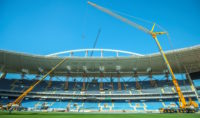India's construction industry grew 4.8% for the year ending in March, down from 8% the previous year, with new impacts from a softening economy, rising materials costs and corruption, according to the government's latest economic survey and other reports.
The rising cost of cement, bricks, steel and other other key materials, up by as much as 30% over the past few years, has taken a toll on construction-sector performance, says the survey.
Other officials point to inflationary pressures and high interest rates, coupled with a severe shortage of skilled manpower, that have increased project delays.
For the year ending in March, the National Highways Authority of India awarded projects covering about 5,400 kilometers, but that fell short of plans to award 59 projects covering 7,300 km. The pace of construction has declined to 10.15 km per day in 2011-12 from 13.72 km per day in 2009-10 , said a government panel, which cited inadequate planning and execution by the authority.
"Progress in implementation has also been affected by poor performance of some contractors, delay in obtaining wildlife clearances from the Ministry of Environment & Forests, railway clearances, law-and-order problems in some states and delay in land acquisition," said Jitin Prasada, the country's transport minister, in a recent address.
Rampant corruption is also a factor. A report released late last year by Global Financial Integrity, a U.S.-based watchdog group, said construction was most prone to the problem because of the disproportionate industry growth, the multilayer complex of contract structures and fewer internal controls.
A recent World Bank report also confirmed “fraudulent and corrupt practices” by contractors in influencing transport agency officials on three highway projects that cost the government $15 million.
Industry officials are hopeful that boosted infrastructure spending and still "relatively buoyant" foreign direct investment will help construction to grow by at least 6% through 2013.
"While this is still below recent highs the sector has witnessed, it does represent a meaningful improvement over the last year,” Sachin Sandhir, managing director of the Royal Institution of Chartered Surveyors South Asia, told ENR.
Sandhir claims that while India's construction challenges "are unlikely to dissipate overnight, the worst of the pressure on the sector has subsided.”
Sandhir points to positive drivers, such as the increasing urbanization of cities, targeted government infrastructure investment of $1.2 trillion in the current "five-year plan," through 2017, and increased private participation in infrastructure development.


Post a comment to this article
Report Abusive Comment